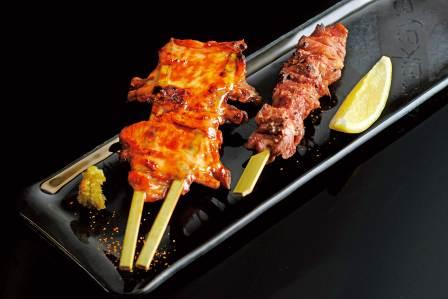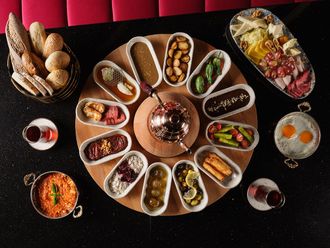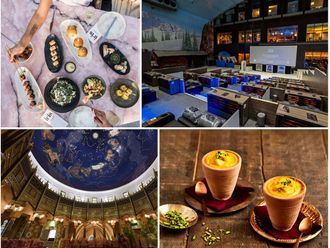
Dubai’s latest darling in its growing love affair with Japanese food isn’t a home-grown brand or an export from the Far East. Instead, Toko comes from Down Under and has been tantalising the taste buds of Sydney’s chic set for a while now. Pegged as a Japanese fusion restaurant, Toko serves up creative wonders such as the quail and bonito dish with fried soba noodles and tempura crumbs and the Boston lobster carpaccio with nashi pear and sudachi ponzu.
The purists may turn up their noses at the concept, but there is no shying away from the fact that the immense popularity of Japanese food exists due to its fusion nature and heavy influence on global foods from Peruvian to Italian. Chefs in kitchens worldwide prefer the more delicate yuzu juice over lemon, or add a dash of soy sauce for that hidden note in their risottos.
While many credit this trend to chef Nobu Matsuhisa, who has infused Latin influences in his chain of Nobu restaurants, Japanese cuisine’s intense impact on the global food culture is undeniable and Dubai is no different.
City chefs headlining Dubai’s most popular Japanese restaurants are unapologetic about their creations and bow their head respectfully to a cuisine that by all standards is considered perfect and pure.
A branch of the double Michelin-starred Italian restaurant, Don Alfonso 1890, that recently opened in the city, pays homage to Japanese food by incorporating the culinary experience in its food philosophy. “It’s all about a focus on cooking with quality ingredients and the importance of food in our day-to-day lives,” Christian de Nadai, Head Chef, Don Alfonso 1890, tells GN Focus. “At Don Alfonso we are very influenced by Japanese cuisine and our menu explores ingredients such as ginger, yuzu lemon, wasabi and soy sauce, among others. Influences from Japan can also be seen in the kitchen from the way fish is cut, to how the food is marinated, down to the presentation, which is simple and chromatic,” he says.
Rainer Becker, founder of hip DIFC establishment Zuma, always aspired to create a menu that would appeal to a wide audience while keeping the right balance between modern flavours and Japanese traditions. Some of the restaurant’s signature dishes include miso black cod, spicy beef, seared tuna with braised onion and crispy fried squid.
Atelier M offers a multilevel dining lounge experience overlooking Dubai’s waterfront district. Its founder and head chef, Mohammad Islam, is heavily influenced by Japanese food, which is evident in the hamachi tartare with avocado and yuzu vinaigrette; Tasmanian crab croquettes with pink grapefruit aioli, Asian pear and apple slaw; oxtail ravioli with sauté mushroom; and chervil jus.
At Mitsu at Lafayette Gourmet, the menu is a mix of traditional and modern. Diners can order a plate of sushi and sashimi as well as, salmon tartare with truffle oil and yuzu or the beef aburi maki roll with the flame-grilled foie gras on top. Signature dishes include the grilled salmon toro, shrimp ball salad, marinated salmon served on ice and the tuna tartare on crispy rice.
Sanabel at the Sheraton, Mall of the Emirates Hotel has a selection of breads baked with Japanese ingredients such as soy, wasabi and seaweed.
Going authentic
For a city that’s relatively recently begun to enjoy the full spectrum of Japanese cuisine, going beyond sushi on a conveyor belt, some chefs believe the only way to go is authentic.
“In this competitive market, many restaurants try to reinvent Japanese food, but like all fusion cuisine this needs to be executed by a master of the art rather than someone with limited knowledge and experience,” says Sebastian Nohse, Director of Culinary at the JW Marriott Marquis who is proud to introduce MasterChef Daisuke Yoshizaki who has recently joined the hotel’s Japanese restaurant, Izakaya — a name that reflects its focus on authenticity.
“Izakaya is focused on being an authentic representation of Japanese food rather than a commercial one,” Nohse tells GN Focus. “For example, even our wasabi is not simply served from a standard pot, but ground fresh at the table on shark fin to keep the fresh flavour and purity.”
Nohse is of the opinion that this is only the beginning when it comes to authentic Japanese fare. “As the world opens up, people will want an authentic version of Japanese food. We see lots of commercialised Asian concepts here — food that has been Americanised — supposedly to suit the international palate. But I do think people want to taste real Japanese food.”
Atelier M’s Islam believes that we are missing some true contemporary Japanese restaurants. “Most of the restaurants here in Dubai are infused with other cuisines. Japanese food needs to be taken to the next level.”
If izakaya-style dining is catching on in the emirate, Dirk Haltenhof, Executive Chef, The Oberoi, believes that dishes such as ramen, nato, shabu shabu and Japanese tapas are yet to arrive. “People in Dubai have just begun discovering this traditional, old cuisine and have only just scratched the surface.”
“In all honesty, the UAE is still too far to achieve optimal Japanese food quality levels,” says Reif Othman, Head Chef, Zuma. “Chefs here definitely have the training and skills to master techniques, but we are challenged by a lack of good produce available locally.
“Additionally, many of the best ingredients contain alcohol, which makes them harder to source. And finally, we have to consider the costs of importing produce to this region, which can become highly expensive.”
What next?
It appears that authenticity will be the next big thing’ when it comes to Japanese food. “The Japanese are very traditional people and do not like to improvise and fuse cuisines,” says Enrico Halili, Head Chef, Mitsu, Lafayette Gourmet. “Most of the trends in Japanese cuisine have not come from Japan and will probably not come from there in the foreseeable future. What is today termed as modern Japanese did not come from Japan but rather courtesy of chef Nobu.”
Working with that assumption, it seems that Dubai will have to create and ride its own wave of Japanese food innovations. Putu Fadly, Executive Sous Chef, Sheraton, Mall of the Emirates, believes that the Japanese gastro pub will take off in a big way. “Gritty versions of these Japanese-style pubs have operated in the US for years, but new gastro-izakayas are offering inspired Japanese small plates with a twist.”











